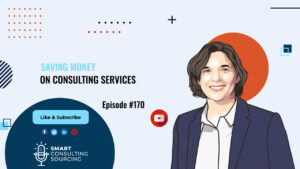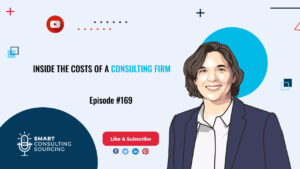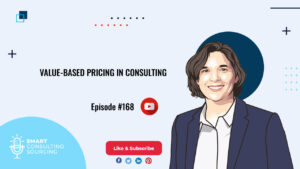Hi everyone, a hearty welcome to the fourth episode of our ongoing series: “How to buy consulting services like a pro.” I will answer the question: “Do I always need an RFP?”
So I’ll start with a short answer, which is the summary from last week’s episode: YES, you do. And here is why.
Just like a roadmap guides you to where you need to go, RFPs are the blueprint that leads businesses through successful collaborations with external consultants.
Clearly defining your project requirements and expectations will help you identify the right consulting firm needed for the job, assess timeline feasibility and budget constraints, and manage change more effectively over time.
A well-crafted RFP will allow you to organize fair competition in bidding processes and facilitate contract management by adding detailed information to SOW or Consulting Agreement contracts. Whether there is competition between consultants or one has already been selected, these advantages still apply!
Above everything else, never forget these facts:
- RFPs are indispensable.
- And successful collaboration between different business units and procurement is the key to creating impeccable requests for proposals.
Don’t miss out on the amazing episode of Smart Consulting Sourcing we released last week! You can listen and subscribe to our podcast via Spotify, iTunes or YouTube at your convenience. If you prefer to read through our content, the full transcript can be found on our website in the Thought Leadership section.
Now, let’s take up today’s question: do I always need an RFP for consulting?
Today I want to provide a more sophisticated answer. No, it does not go against what I stated last week. Indeed, you will always require an RFP. However, that isn’t always the initial step in your journey. It will depend on the level of development of your project.
Ever wondered what goes into the initial stages of a project? Let me explain.
Visualize a horizon that traces your new endeavor’s maturation; on the left, you will find ideation where all your considerations lie – should I launch it? What are my choices, and why am I doing this in the first place, to solve which problem?
Further, on the right, you will find the execution stage. Now you have a clear idea of what you want to achieve. And you have to explore how you could deliver that project. Will you outsource or keep it in-house? What consultants can help me attain my goals?
And somewhere between these two points – ideation and execution- you will find the definition of your project’s needs and scoping.
If we come back to the ideation phase, at that point, you don’t have a clear idea of what you want to achieve, and the level of likeliness of the project is low. This is usually the RFI stage. RFI is an acronym for Request For Information.
Businesses send RFIs to explore the market, ask questions and better understand what consulting firms could do, what approaches they use, what references they have, and so on. This information-gathering process will vary based on the type of project – the complexity, the timeline, and the budget.
But before we move on, let’s pause to ensure that the term “approach” used in proposals is fully understood. This word encompasses a combination of capabilities as Strategy, Organization Design, and Procurement Excellence), the methodology employed by consultants, and how they will direct each project (will workshops be organized? Interviews conducted? Hands-on or collaborative?), among other components.
All these elements are combined into one broader concept, termed as an “approach.” Typically, each consulting firm has its distinctive approach that serves as its unique ‘consulting DNA.’
Having laid that groundwork, let’s take a look at an example. Take, for instance, a chemical company that wishes to assess the megatrends in the consumer goods industry (their clients’ end-user market).
However, they are unsure of which project and approach to take. Megatrends can be examined from a strategic, marketing, or innovation viewpoint. They could organize an RFI inviting different consulting firms covering the Strategy, Marketing, and Innovation capabilities and asking them to pitch their services.
After this, they should be able to decide which approach is more suitable and write the associated RFP.
In a matter of moments, they shifted from the ideation stage to the execution phase; now, having an RFP in hand, they are ready to begin searching for their ideal consulting firm.
In short, RFI is when you are unsure what to do and need guidance. Conversely, if you have a specific plan in mind and know which consulting firms to partner with, that calls for an RFP.
Now, let’s explore the options between RFI and RFP for Consulting.
Between RFI and RFP, there are a few questions to be considered:
The first question to ask yourself when you think about launching a project is: “Am I clear on the problem I want to tackle?”
If the answer is no, you need to organize an RFI round. You can organize internal workshops if you don’t want to or can’t organize an RFI process. But you won’t have access to external expertise.
I want to take a short break here to talk about brain-picking.
What is brain-picking? It is when you want to use someone’s knowledge for a short period without compensation. That’s the basis of consultative selling. So it is fair game to ask a couple of questions to a consultant about a potential project, even if you don’t intend to launch it with them.
However, some companies abuse the RFI process and brain-picking. They take advantage of consultants to gain knowledge without intending to pay. It’s more like a brain drain. In the worse cases, they ask a consultant to propose and then run away with the approach and the project breakdown.
At Consulting Quest, we experienced these unethical practices and can vouch that these stories are true!
So don’t be that guy! We understand that a project is canceled, you don’t have a budget, or you want some insight. And we are OK to provide some free support. But it depends on the context, so make sure your intentions are clear.
I had a much longer break than I expected. (Our enthusiasm for this topic is hard not to notice, don’t you think?)
Well, back to our topic. If you are clear on the problem to tackle, the Second question to ask yourself is, “Do I know the type of approach I want to take?” If your answer is no, the best way to go about it is by organizing a bid that begins with an RFI round involving numerous consulting firms.
This will enable you to determine which approach would suit your requirements and help you compose a thorough RFP. Afterward, move on to a second round using your RFP, but this time limit the number of participating consulting firms.
Compared to a traditional RFP process, this one is more comprehensive; the initial exploration phase can be iterative and might take extra time until you find the right fit.
Do you remember the example I used earlier with the chemical company that wanted to explore megatrends? That’s the option they used.
During the first round, they invited six companies, two focused on one capability. That’s how they realized that the approaches that best fit their needs were the ones proposed by the Strategy firms. Then the second round was an RFP round between the two Strategy consulting firms and an additional incumbent firm.
Now let’s say you know what type of approach you are looking for. You know what capability you need and what methodologies you are interested in. And you might even know what consulting firms you want to invite to the table. All of this means you are ready for a pure RFP process.
But, yes, there is a but, there is still a last question you can ask yourself: “Am I flexible on the delivery model and the format?” What does that mean? You know precisely what you need. It can be because it is a sequel from an existing project or an implementation following another project. Whatever that is, you know what you want.
Speaking of the delivery model, we highly recommend you take a quick look at this episode: Selecting the right delivery model for your consulting project.
For instance, once, we were asked to find a consulting firm based in Brazil with strategy and marketing capabilities that could help implement new working methods developed at the group level and deployed globally. The company has found suitable consulting firms everywhere globally but not in Brazil. And they wanted all the units to get the same treatment.
But sometimes, the client is more flexible. That’s when we recommend designing an “open” RFP. Generally speaking, the RFP for consulting should not describe the “how” in too much detail.
As I mentioned, the “how” or the approach is a consulting firm’s DNA and often its differentiator. And they probably know more about what works and what doesn’t that you do unless you are a former consultant with the same expertise.
Therefore, your primary focus should be describing the problem and establishing your desired outcomes. To save time for all parties involved, you can highlight your constraints or ideas that are off-limits; however, it is essential to maintain an open attitude when creating an RFP.
You can offer more room for creativity in your RFP. Let’s say that most consulting firms, especially when they don’t know you as a client, will use a relatively conservative approach to a given problem.
Adding a straightforward statement such as “Or any similar approaches” or even better, “or any approach that deems more fitted” to your RFPs could open up the possibility of receiving creative responses that might surprise you!
Before I wrap up, I must emphasize the importance of streamlining these processes to ensure they are not overly time-consuming. The best strategy to take when inviting consulting firms is to limit the number at each stage.
This will vary depending on the project scale and which round you’re in. The consulting firm is likelier to work hard if there’s a greater chance of winning the project. And therefore, you will end up with much better proposals. Typically, a win-win situation.
Closing Thoughts on how to streamline the process when you launch RFP for consulting project?
With that, let’s draw our discussion to a close. RFI, or Request For Information, is an indispensable tool for analyzing the market and gaining insight into what consulting firms offer. Brain-picking (free consultation) may be beneficial, but it should only be utilized punctually and for short periods.
In the ideation phase, projects may require an RFI process or internal workshops to clarify the problem. When the plan is clear, you can (and you should) formalize it into an RFP.
Unsure of the correct methodology? Start by engaging multiple consulting firms with a Request For Information (RFI) round, then narrow down your options using an RFP in the second step but include fewer consulting firms.
To ensure your RFP process is smooth and successful, limit ideas for those submitting them but leave room to let their creativity flow. Don’t forget that restricting the number of invited consultants at each step will help shorten proceedings overall. So, there you have three easy steps to create an efficient responding-proposals procedure!
To stay up-to-date with the latest trends in the consulting world, also read our latest Insight: “Looking Ahead – How Consulting Clients Can Prepare for 2023.”
Don’t miss out on our upcoming episode! Are you ready to make your mark in Requests for Proposals? We’ll discuss best practices and how to get ahead when crafting an RFP. Tune in next week for expert insights about who should be involved, what makes a successful proposal, and tips that savvy procurement professionals need to know to facilitate the process!
Until then, stay safe and happy sourcing. If you have any questions regarding today’s or any consulting procurement-related topic, don’t hesitate to contact me directly on LinkedIn or by email because I’m always game for a chat.
Bye and see you next week, au revoir.







